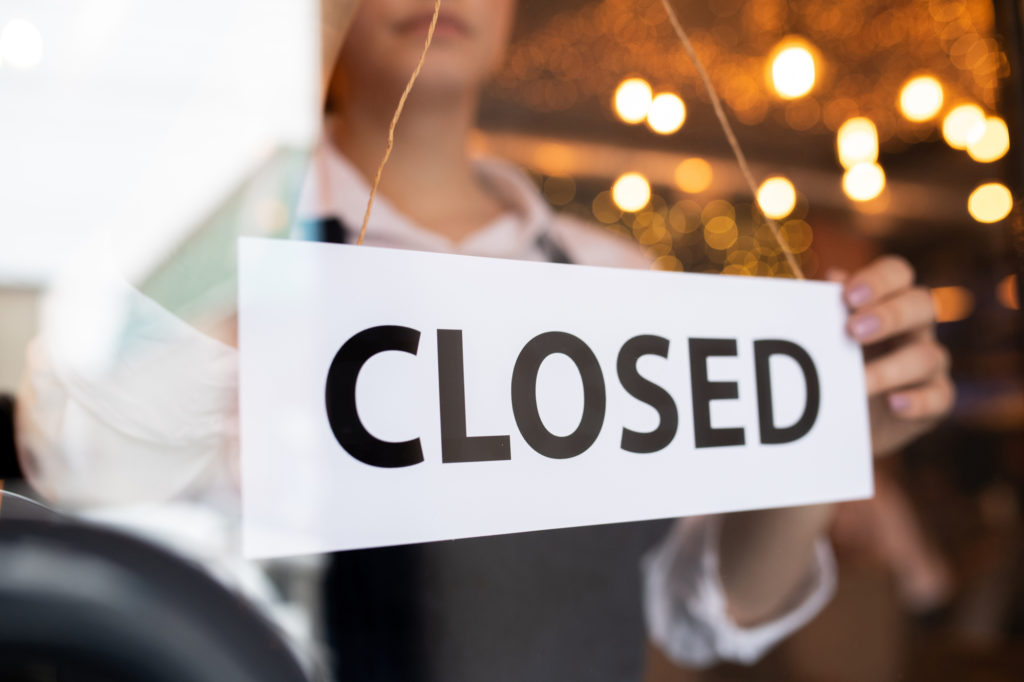 According to TrackTheRecovery.org, the number of small businesses that were open on November 16, 2020, as compared with January 1, 2020, decreased by 28.9%. It’s likely that this isn’t the final count. Kenny Roger’s song instructs: “You’ve got to know when to hold ‘em, know when to fold ‘em.” For small business owners that have suffered through the pandemic but are still hanging on, it’s important to know when to stop valiant efforts and close up shop.
According to TrackTheRecovery.org, the number of small businesses that were open on November 16, 2020, as compared with January 1, 2020, decreased by 28.9%. It’s likely that this isn’t the final count. Kenny Roger’s song instructs: “You’ve got to know when to hold ‘em, know when to fold ‘em.” For small business owners that have suffered through the pandemic but are still hanging on, it’s important to know when to stop valiant efforts and close up shop.
The following are some financial and personal factors to consider in making this very difficult decision to close a business.
Financial factors
A business can’t continue to function unless it brings in revenue. During the pandemic, some businesses saw their sales decline dramatically. They have been able to stay afloat by owners putting in more of their own capital (e.g., using home equity loans; tapping into retirement plan savings). Some have begun to make a comeback; others have not. In deciding in which category you fall, check your key indicators:
- Sales. If customers haven’t returned and are not likely to in the numbers needed to meet your monthly operating costs (forget profits for the moment), there’s no way to remain a viable business.
- Cash flow. If you don’t have the cash to pay your bills, you can’t continue. How much of your personal capital can you to continue putting in?
- Balance sheet. If liabilities are weighing too heavily on your balance sheet, it might not be wise to go on. Consider the impact of your personal guarantees for business owners and what it’s going to cost you to continue making business expenditures while having to meet your personal guarantees.
Make projections on what to expect in the next month, next three months, or next six months (if you can continue to pay expenses for that long). If key indicators don’t improve, or have a realistic chance of improvement soon, it doesn’t make sense to continue pouring money into a losing proposition.
Another financial factor to consider is the return to you. Is the business capable of providing you with the income you want compared to what you could earn on a job with another company? In other words, is the business profitable enough to justify your continued time and effort?
Finally, determine whether financial conditions are the result solely of the pandemic or of a bigger problem. Perhaps the marketplace has moved on from your offering because your products or services are no longer in demand. Clearly, if this is so, it’s time to close down.
Personal factors
Even without experiencing COVID-19, the pandemic has taken a toll on the physical and psychological health of many people. The stress has been considerable, especially for business owners struggling to make payroll and keep their doors open. If you are feeling the effects of the pandemic (anxiety, depression), it may be time to call it quits for your business and concentrate on your personal recovery.
Another personal factor is your emotional attachment to the business. Even without the pandemic, many businesses, especially startups, fail but owners try to hang on because of their feelings about their venture. They’ve put so much of themselves into their business. Ego and emotions shouldn’t be a determining factor in whether to continue a business that’s doomed to fail.
Yet another personal factor is your enjoyment. Businesses are started by people who are passionate about what they do. If the thrill is gone, what’s the point?
Final thought
Having to shut down a business may seem like a failure; it’s not. There’s no shame here. Many highly successful business owners have had activities they had to abandon, only to move on to more successful ones. The closure of one business is really a step forward…toward your next venture.


